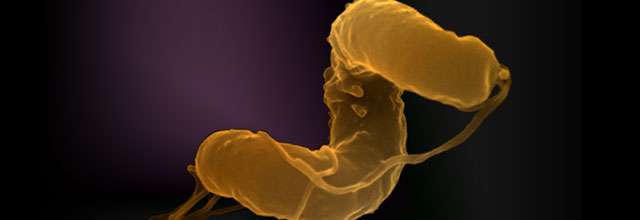The evolutionary secret of H. pylori to survive in the stomach

Professor Frédéric Veyrier's most recent research, in collaboration with the team of Professor Hilde De Reuse at the Institut Pasteur, has shed light on key genes essential to the pathogenesis of Helicobacter pylori bacterium, which causes gastric infections. Like other microorganisms, this pathogen underwent genetic modifications through the course of evolution that enabled it to adapt to its environment.
Nickel is, in fact, the evolutionary key that allows the pathogen to survive the very acid conditions of the stomach. This metal is a cofactor of two essential proteins, one of which is urease, an enzyme that neutralizes gastric acid. Therefore, to colonize the stomach, the pathogen needs an efficient nickel transport system. By examining the bacterium's entire genome, the research team identified a new nickel transporter that appears to be essential for the metal acquisition. Once inside the bacterial cell, nickel regulates the synthesis of urease, which in turn neutralizes the acid from the stomach. This gene, along with a number of other genes encoding proteins involved in nickel homeostasis, was acquired a long time ago by the bacterium via horizontal gene transfer.
Metals are often key players during bacterial pathogenesis. It is the case for many other microorganisms, including pathogenic strains of Escherichia coli, in which iron plays a major role in its ability to infect the host. However, the genetic reshuffling leading to metal homeostasis modifications in Helicobacter pylori and allowing it to adapt to the gastric environment seems to be quite unique.
Further genetic studies should enable researchers to identify other genes that have been dropped or acquired through evolution, giving microorganisms the characteristics they need to colonize their hosts and cause disease. In a way, we these genes can be considered as messengers from the past. This research work will be used to develop strategies for fighting these infections.
More information: Frédéric Fischer et al, Characterization in Helicobacter pylori of a Nickel Transporter Essential for Colonization That Was Acquired during Evolution by Gastric Helicobacter Species, PLOS Pathogens (2016). DOI: 10.1371/journal.ppat.1006018
Journal information: PLoS Pathogens
Provided by Institut national de la recherche scientifique



















